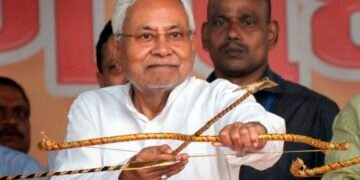In a unanimous verdict, a five-judge Constitution Bench of the Supreme Court on February 15 struck down the electoral bonds scheme 2018 as unconstitutional. Saying that financial contribution to a political party may potentially lead to quid pro quo arrangements, the judgment authored by Chief Justice of India (CJI) D Y Chandrachud said the electoral bonds scheme by anonymising contributions to the political parties infringe upon the right to information of the voter provided under Article 19(1)(a) of the Constitution.
Asking the State Bank of India (SBI) to forthwith stop the issuance of electoral bonds, CJI Chandrachud ordered the Election Commission of India (ECI) to publish on its official website by March 13 the details of the political parties which have received contributions through electoral bonds since April 2019. Chandrachud’s opinion, concurred by Justices B R Gavai, J B Padriwala and Manoj Misra, added that the infringement of the right to information of voters cannot be justified for the purpose of curbing black money in the electoral process.
Saying that the political contributions give a seat at the table to the contributor, i.e., it enhances access to legislators and this access also translates into influence over policy making, the Supreme Court held it “manifestly arbitrary” to permit unlimited political contribution by the companies, saying that contributions made by companies are purely business transactions made with the intent of securing benefits in return. In sum, the apex court declared the amendment to the Income Tax Act introduced by the Finance Act, 2017, the amendment to the Companies Act, 2013 and the amendment to the Representation of People Act as unconstitutional.
The Supreme Court’s decision is being seen as a setback for Prime Minister Narendra Modi’s BJP, which has been the largest beneficiary of the system it introduced in 2017. Under the electoral bonds scheme, a person or company could buy these bonds from SBI in denominations ranging from Rs 1,000 rupees to Rs 10 lakh and donate them to a political party of their choice. While donors using electoral bonds are technically anonymous, SBI being a public sector bank effectively gives the governing party undeclared access to its data, which is likely to dissuade large donors from using electoral bonds to donate to opposition parties.
According to Election Commission data, 28,030 electoral bonds worth Rs 16,437.63 crore were sold between 2016 and 2022. The BJP was the primary beneficiary of these donations and received Rs 10,122 crore, nearly 60 per cent of the total donations. Donations made to the BJP through electoral bonds were three times more than that of all other 30 parties combined on the list. These funds have allowed the BJP to transform itself into a dominant electoral machine. Electoral bonds have provided the BJP with a massive injection of resources, which give it a clear edge over its rivals.


























